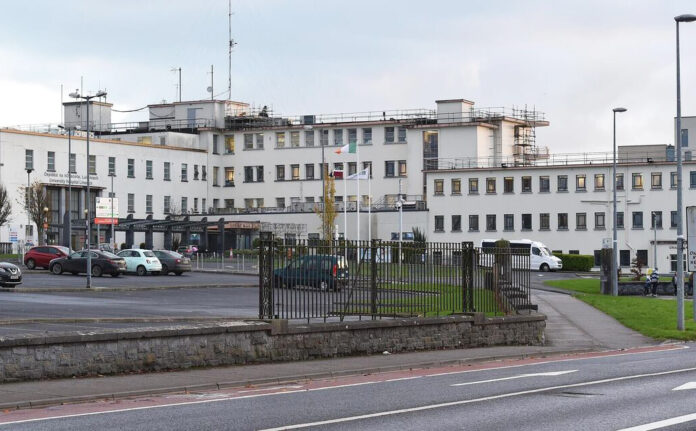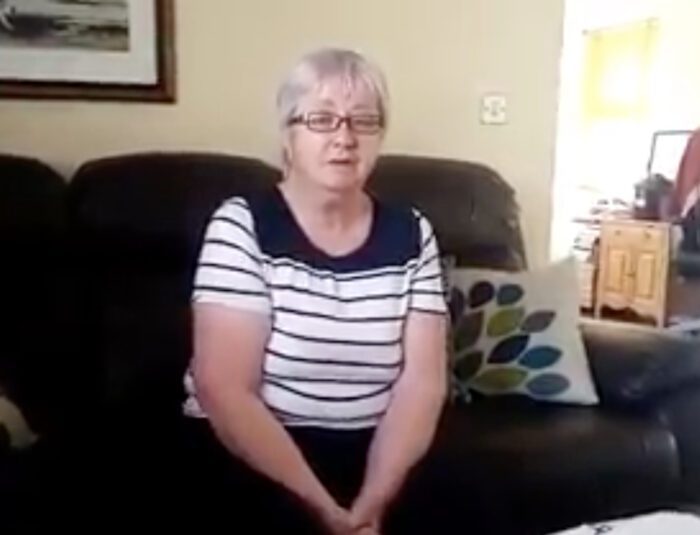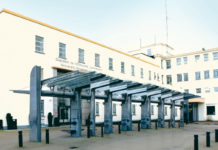
THE WIDOW of a man who died at the chronically overcrowded University Hospital Limerick said that she would rather die at home than attend the Limerick hospital, which nurse union managers today described as “persistently dangerous” for patients and their staff as a record-breaking 130 patients languished on trolleys there.
Clare native Marie McMahon, who is also a volunteer with the Mid West Hospital Campaign group, said: “To be honest, I wouldn’t go, I’d just say ‘leave me be’ and if I die, I die. I’m genuine about that, I’m not just saying that for the sake of a sound bite, I’m genuinely saying that.”
Ms McMahon has been calling for the reopening of emergency departments (EDs) in Ennis and Nenagh and St John’s (Limerick) hospitals since the death of her husband, Tommy Wynne, in 2018, after he spent 36 hours on a trolley in a corridor at the hospital suffering with stroke-like symptoms.
“Looking back over the past few weeks, the trolley numbers have gone over 100, and where are our politicians, where are the people we elected to be our voice? Nobody has raised it, that’s not good enough, they need to be standing with the people,” Ms McMahon said.
“There’ll probably be a flurry of press statements today but they are not worth the paper they are written on,” the widow hit out, asking “how many people have died as a result of overcrowding?”
“They are not prepared to do anything about it but they are prepared to let us die, and really, that’s the bottom line.”
“What is also really, really important to highlight is that, when the INMO trolley figures are counted, they only count Monday to Friday, they don’t count Saturday, Sunday, or bank holidays, so when you see the monthly and yearly figures, you’re only seeing the problems Monday to Friday.”
A previous record of 126 patients on trolleys at UHL on April 21, 2022, sparked a national outcry from patients, politicians, and hospital campaign groups for the reopening of 24-hour EDs in Clare and north Tipperary, that were closed and funnelled to UHL 14 years ago.
Ms McMahon asked: “Who are these clinical experts that are saying one emergency department is okay for 400,000 people in Limerick, Clare, and north Tipperary? Why don’t we know how they are and why are they not held accountable?”
“We have so-called experts and politicians telling us what’s best for us, but what about the people? Where is our voice and who is listening to us – nobody is listening to us and we don’t matter.”
“We are being pushed from pillar to post, we have had to beg to be heard and we just keep getting fobbed off and plamaused. Nobody will even commit to one extra ED in the Mid West region, let alone two of them, nobody is advocating on our behalf.”

A statement issued by INMO Assistant Director for Industrial Relations for the Mid West, Mary Fogarty, read: “Our members are burnt out and demoralised as a direct result of their working conditions. It is impossible for them to provide safe care in a working environment that is persistently dangerous.”
“INMO members in the hospital (UHL) met last week to discuss their grave concerns about their safety and that of their patients. INMO members feel that none of the interventions directed by hospital management have had any positive impact to date.”
Ms Fogarty said the latest trolley figures at UHL came “as no surprise to our members who have been working in overcrowded and understaffed wards with no reprieve for years on end”.
“The fact that there are more patients on trolleys across the hospital itself than in the emergency department itself is making the provision of safe and timely care impossible,” she said.
Ms Fogarty said efforts by the UL Hospitals Group to improve “patient flow out of the emergency department is proving difficult because of the sheer volume of trolleys across the hospital”.
She called on UHL management and the Health Service Executive to immediately “outline what targeted interventions they intend to carry out to take the pressure off our members for the sake of patient safety”.
UHL has undergone major investment in the past six years, including the opening of a €24million emergency department in 2017, however patient overcrowding has worsened steadily since.
A 96-bed unit is currently being constructed on the ground of the hospital however only half of the beds are considered additional beds, as 48 beds will replace existing bed capacity at UHL’s nightingale wards, and a second 96-bed unit has gotten the go ahead but construction has yet to start.
Responding to the INMO statement, UL Hospitals Group said UHL remained “exceptionally busy, with 225 patients having presented to the Emergency Department this Sunday, significantly higher than our standard weekend attendance levels, and a high number of inpatients”.
It said there were 39 admitted patients on trolleys in corridors in the ED and a further 25 patients in designated single rooms and cubicles in the department.
The group said there was 87 admitted patients in total “waiting outside of designated bed areas across the hospital”, including 24 patients boarded in the Acute Medical Assessment Unit, and 34 patients on trolleys in inpatient wards.
“The level of overcrowding is far in excess of where we want to be, and we apologise to every one of our patients who faces a long wait time for an inpatient bed,” it said.
The Group said it had opened surge capacity across its six hospital sites in the region to transfer patients on trolleys across inpatient wards, adding that additional ward rounds were being undertaken by medical teams “to expedite discharges or identify patients suitable for transfer to Ennis, Nenagh, and St John’s Hospitals”.
UHL is currently reviewing elective surgeries across the group “while ensuring that the most urgent and time critical cases can be accommodated as scheduled”.
“Other admissions avoidance measures introduced include the opening of the Geriatric Emergency Medicine (GEM) Unit at UHL and the expansion across the region of the Pathfinder service, where NAS paramedics and health and social care professionals from UL Hospitals Group respond to low acuity ambulance calls from the over 65s and provide assessment and support in the home aimed at avoiding a hospital admission.”
While “urgent care” was being prioritised, ULHG said “anyone attending ED who doesn’t have a life-threatening or severe illness or injury will face a significant wait”.
It said “everyone in the Mid West can help reduce pressure on the ED by considering all the options available to them if they need medical attention” and urged people with non-urgent health complaints to visit their GP or walk-in services and local injury clinics.









